
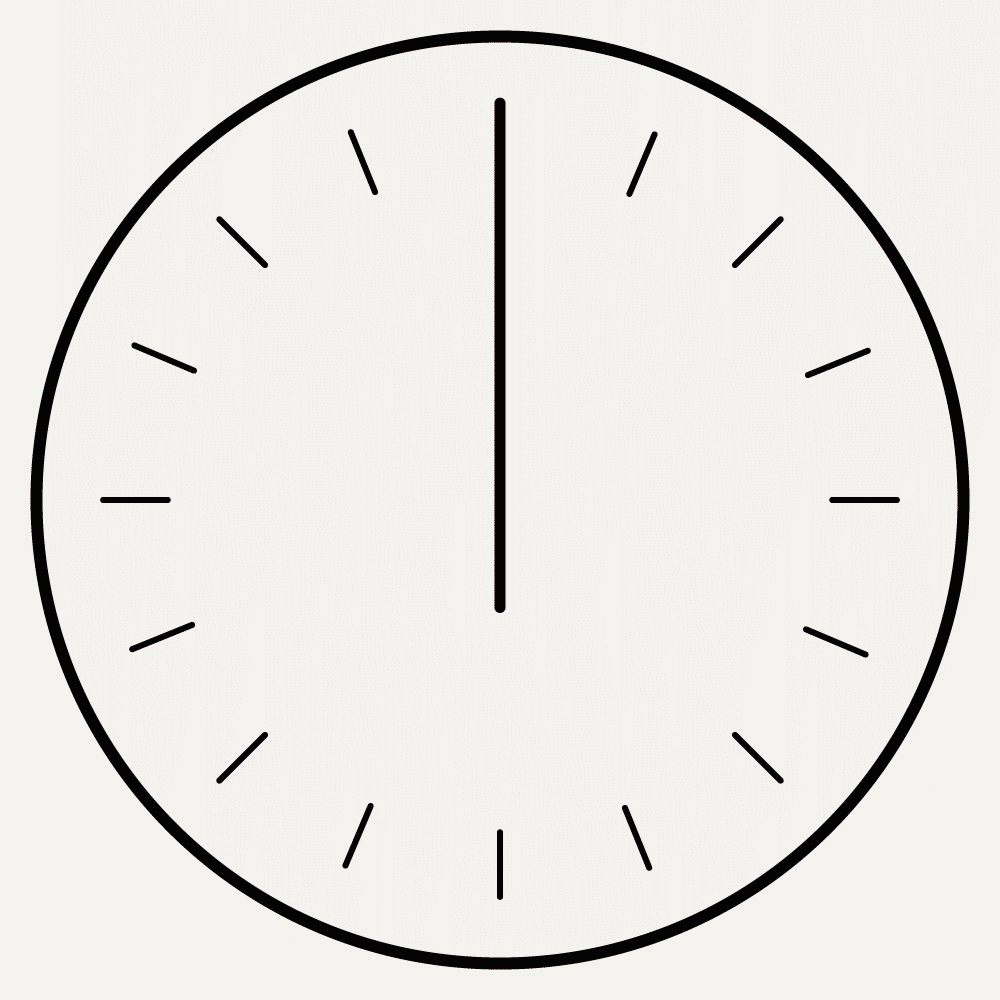
3 days


Alone
Context
We were given 3 days to find a brief and prototype a solution to it. I decided to head towards students being late, as it's a huge problematic in our school so I knew I would find users around me. It was also the chance for us to try to apply Google's sprint methodology.
Personal Mindmap
Before starting to research the topic, I tried to asses what makes people late in my opinion. This will allow me to be less biaised once finding a solution, as I can see what I drew from my mind and what I found out.
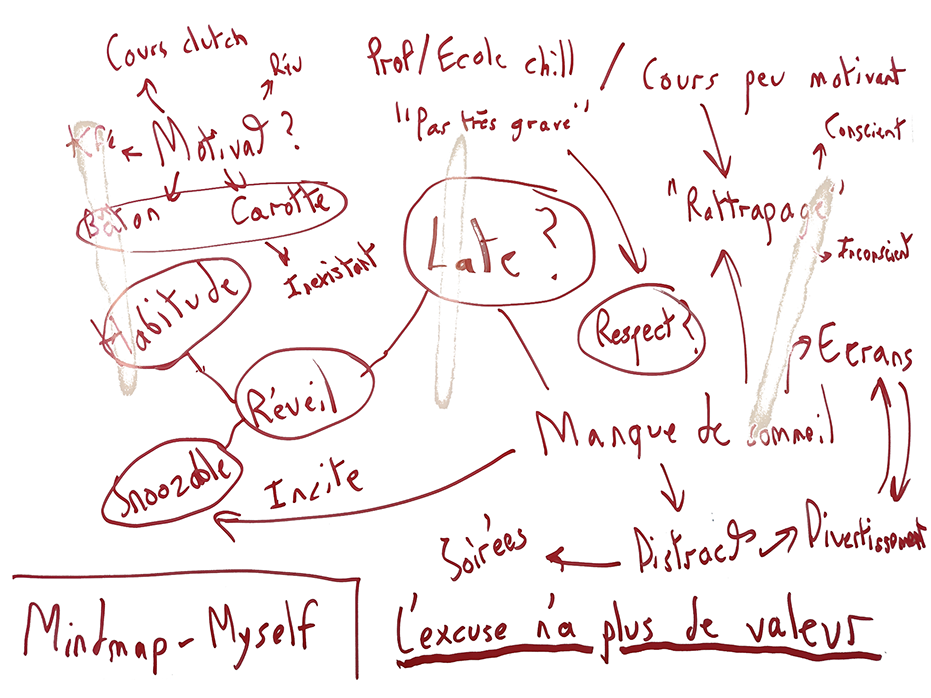
Basically, I thought that people being late was due to the fact that it's "allowed" in a certain way; which means people don't really care about it.
The experts
When researching the topic, I tried to find "pro tips" for being on time in the morning. You'll always end up on very entrepreneurial websites, often putting the fault on bad habits and lack of sheer will.
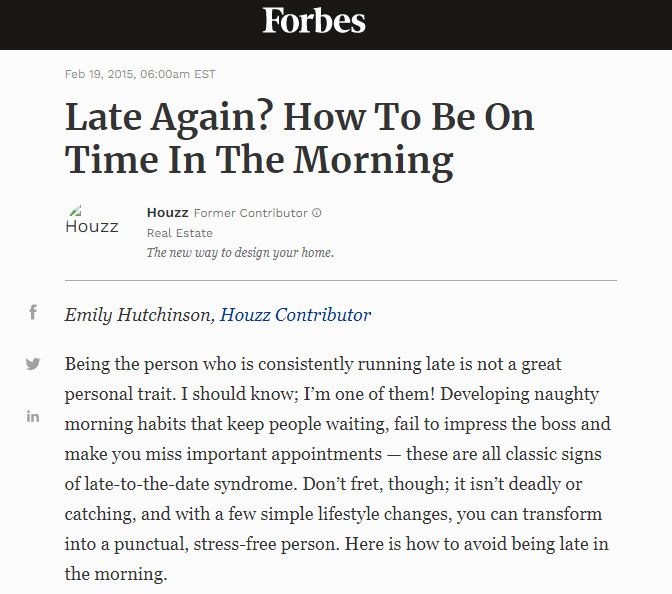
The people
My first direction was to find testimonies of people that are late in the morning and try to see what was the reason for it. But thanks to the rabbit hole that is quora, I was able to find a full community of people dedicated to help others on this topic.
It was very interesting because everyone had their way to get up: some do sport, some have a good breakfast, some put the alarm in the other corner of the room...
This was very inspiring as I was able to draw insights from their advice that would be of great help later

Two points of view - almost opposite
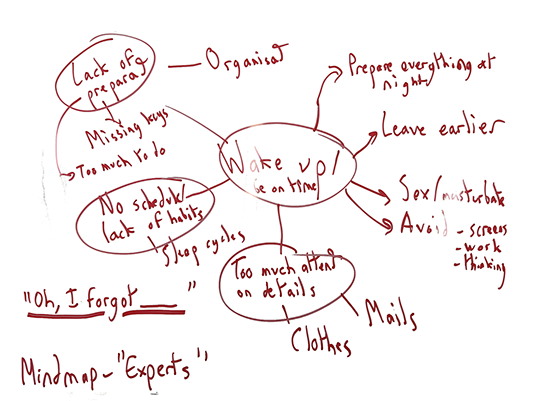
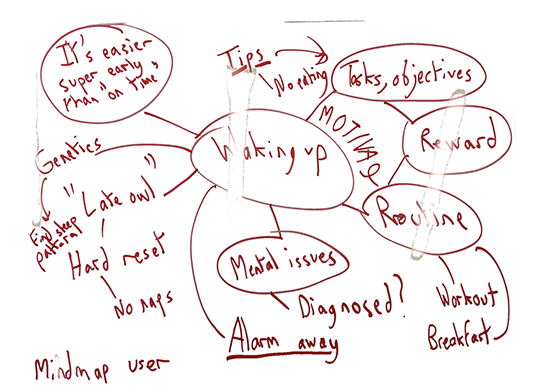
What's very interesting once you lay the research that way is that you can really see the difference between experts and people.
On the expert side, what comes out is a lack of preparation: not knowing what clothes you'll wear, not having your keys on the right spot, checking your phone at the last minute...
The people, on the other side, tend to find reasons to wake up. They talk about sleep patterns, getting up way earlier than needed to reset your "body clock", rewarding yourself for getting out of bed with a breakfast or walk.
Even though they might seem almost opposite, these two vision are actually close once you put them as insights
Insights
- Being on time starts the night before, whether it's going to bed on time or organizing
- To get out of bed, you need motivation
- Everyone is different, there is no magical solution
- Snoozing is a hard habit to lose, but almost mandatory
Quantitative study
Now that I knew more about the topic, there were 2 things I had to do:
- Make sure the insights I had were relevant to my actual users
- See the main reason(s) people are late in my school, to focus on it
To do so, I made a Typeform and sent it around the school
-crop-u14590.jpg?crc=4212386485)
.jpg?crc=172863220)
.jpg?crc=3993836593)
.jpg?crc=4041804374)
.jpg?crc=162263787)
.jpg?crc=3782106820)
.jpg?crc=4024340513)
.jpg?crc=4210514748)
.jpg?crc=258255366)
-crop-u15077.jpg?crc=3786521490)

72x56.jpg?crc=449082792)
-crop-u15063.jpg?crc=382620488)
83x54.jpg?crc=445140577)
-crop-u15083.jpg?crc=3854175568)
77x54.jpg?crc=3955397829)

-crop-u14963.jpg?crc=4288417007)
84x54.jpg?crc=150480075)
-crop-u15003.jpg?crc=4140264497)
-crop-u15023.jpg?crc=215805019)
83x54.jpg?crc=28622705)
There's an opportunity for an app
It's not a fixed problem: there are varying parameters
Phrase completion for semi-quali results
This one suprised me a lot, I expected way less to answer yes
Snoozing isn't that much of a problem it seems
Time spent in bed before getting out
A word art of the results to better envision the reasons
11 - 11
<
>
Qualitative study
While the form was being filled, I started doing interviews to better understand the different profiles of users.
.jpg?crc=4075686968)
.jpg?crc=97508852)
.jpg?crc=126145671)

72x51.jpg?crc=2731645)
72x53.jpg?crc=3759388626)
65x54.jpg?crc=4560891)
4 - 4
<
>
Persona


2.jpg?crc=4222477629)
Thibault doesn't like being late, but it still happens
Chronoception: how much you are aware of time passing by
1 - 3
<
>
From quali, I realised there are a lot of different profiles. I decided to focus on the one that I felt had the most potential : The student that tries to be on time, but doesn't manage to do so everyday and is not sure why.
The problem mainly consists of bad management of time in the morning, fluctuating time spent on different tasks (drinking coffee, showering...) and lack of motivation for getting out of bed.
Value proposition Canvas
2.jpg?crc=3883542767)
The opportunity here lies in allowing people to follow their morning routine AND be on time. This can be done in many ways, but the most important points are getting the user out of bed smoothly, giving them enough sleep and improving their Chronoception.
Rebrief
Creativity
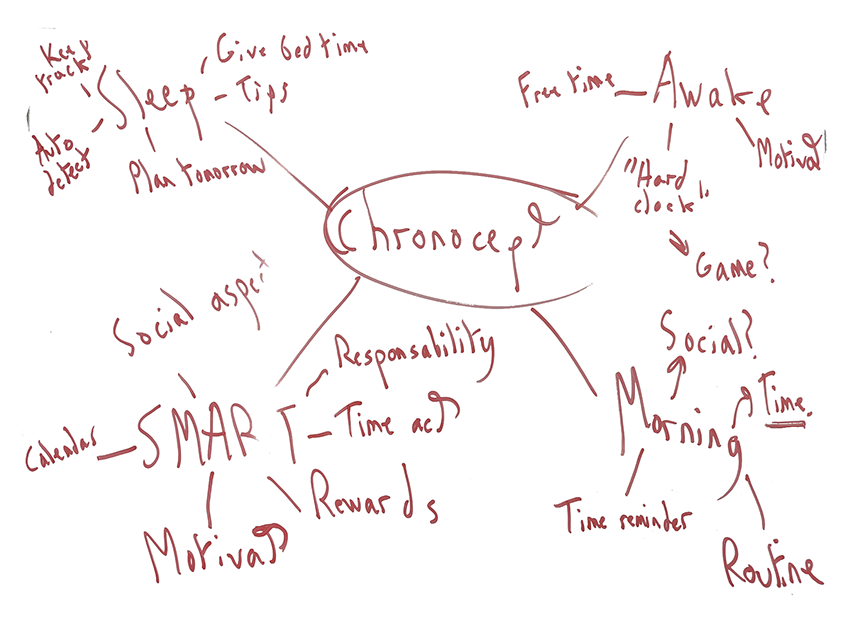
In order to help people, I wanted to focus on a few specific points:
- Measuring the time they need in the morning so they don't leave home late
- Give them SMART objectives so they know why they should wake up at a specific time
- Help them go to bed at the right time, and prepare for the next morning
If these points are united, people have a reason to go to bed at a certain time and most importantly to wake up at a specific time. This means decreasing the randomness of activities in the morning, making snooze a conscious action, and help them have a better morning experience.
Features
So, what is this application made of exactly ?
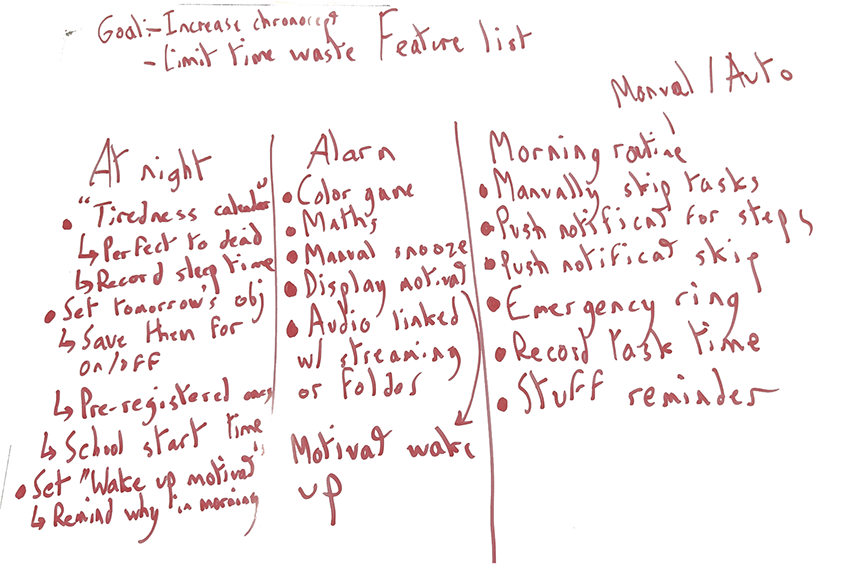
It's separated in 3 categories: before bed, the alarm itself and the morning routine.
Before going to bed, users reports how tired (or not) they were, so they have a record of it. This allows them to better understand how they body works. They then set their routine for the morning, choosing what they'll do before leaving, and set their motivation for the next morning. It's the reason that will be displayed on screen for them to wake up.
You set what time you have to be at school, the time it takes for you to get there, and the app automatically sets an alarm time. This means you have no idea of the exact time it will ring, and makes it more efficient.
Then the alarm part. To shut down the alarm, you have the choice between a game, maths, and a color puzzle.
You have to complete it to snooze, which means you can't do it by reflex anymore.
Then comes the morning routine, where you'll have notifications telling you of what you should be doing at the moment, and an emergency alarm to tell you it's time to pack.
Content
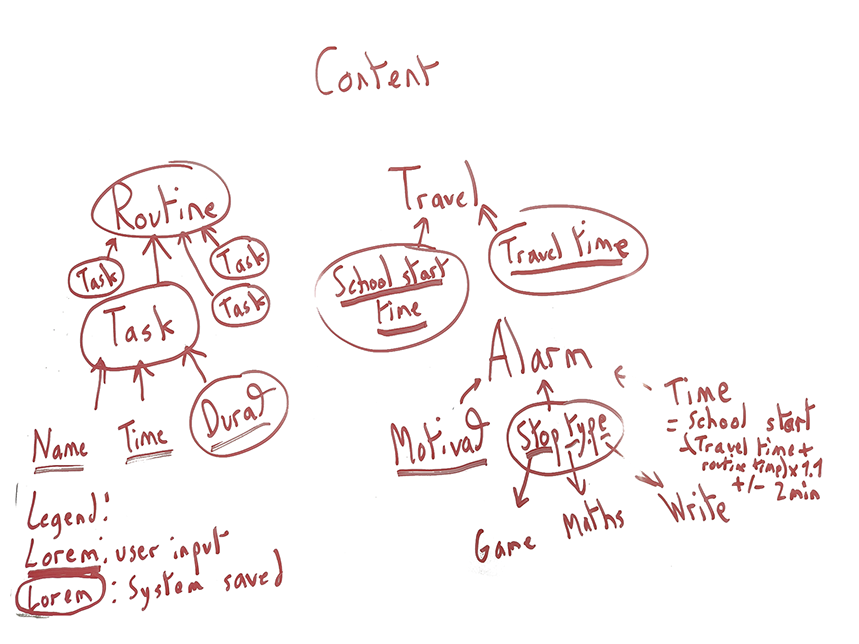
Your routine is made of tasks, which you set manually and can time in order to make sure you have the correct duration.
The alarm itself has a small formula that will make sure you can't anticipate precisely the time you have to wake up.
Wireframe
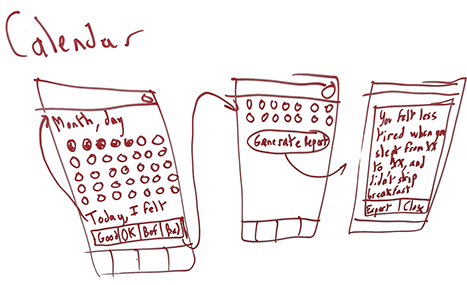
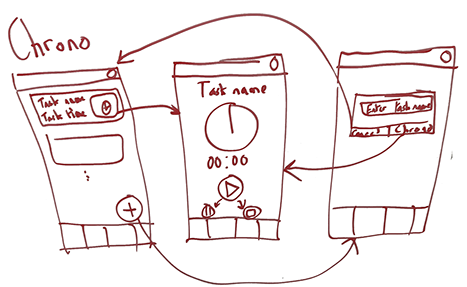
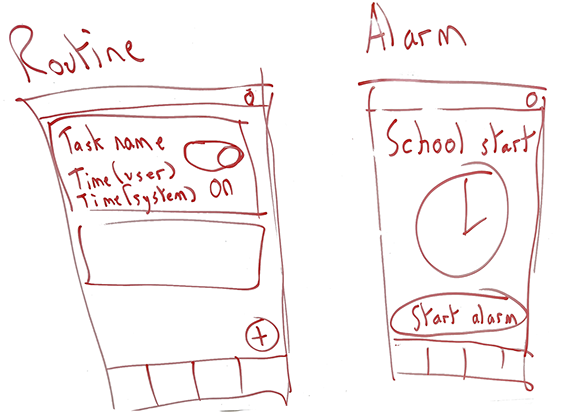
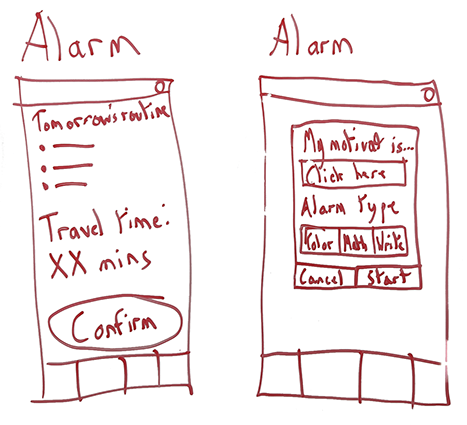
The app is separated in 4 screens: Caendar, Alarm, Routine and Timing.
The calendar is where you access your sleep reports, Routine is where you activate / deactivate tasks for the next morning, Timing allows you to time tasks to make sure you got them right, and Alarm is where you set the school start time and motivation
With only 1 day left before the deadline, I rushed in Unity and started prototyping
(This is a very heavy GIF, if you see this text it means it's still loading, sorry for the inconveniance)
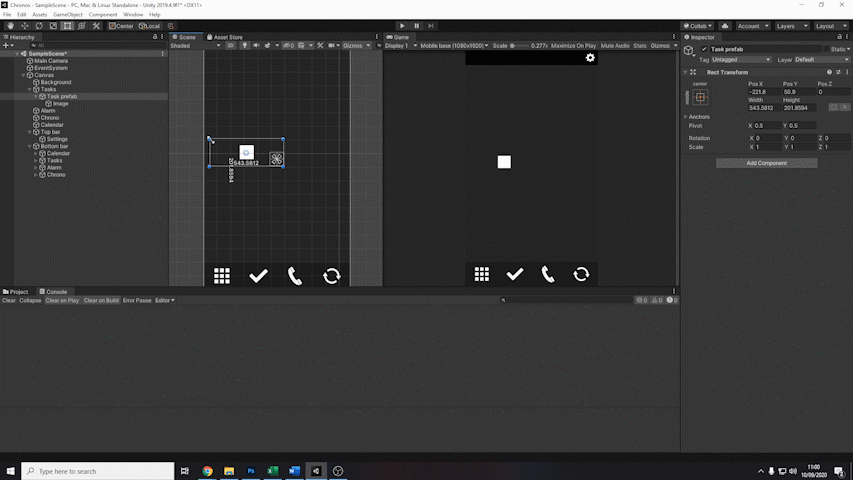
The result is, let's face it, very ugly; but it's functionnal !
Let's see what made it
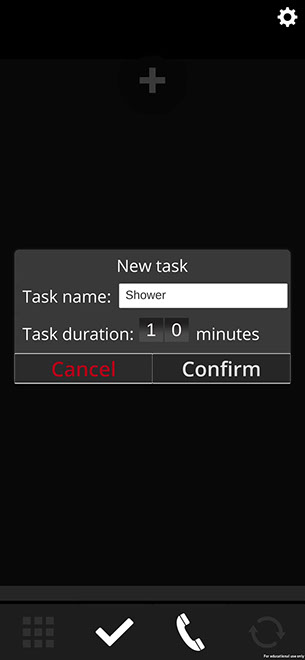
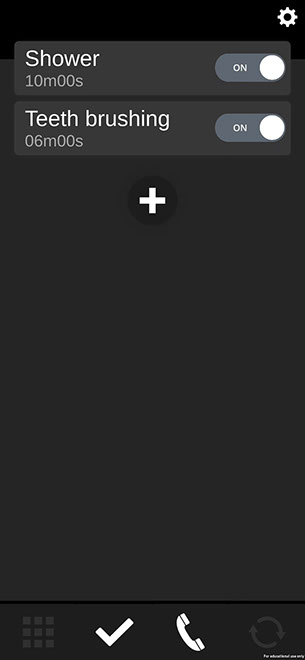
Tasks work, you can create them and enable / disable them and it's taking into account for setting alarm time
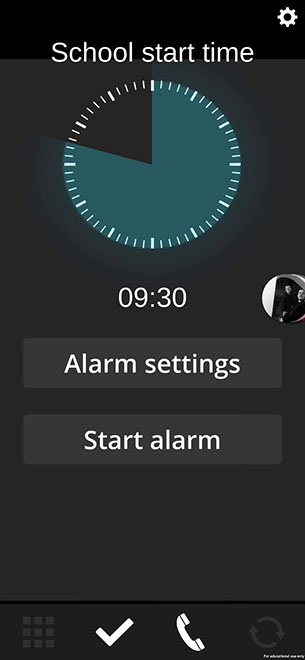
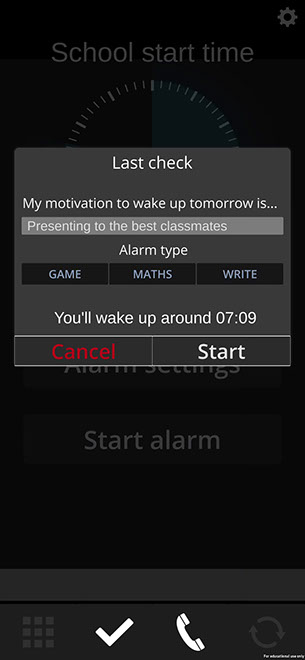
Setting the alarm works, and you can choose between the different alarm types, the time calculates accordingly to your routine and travel time
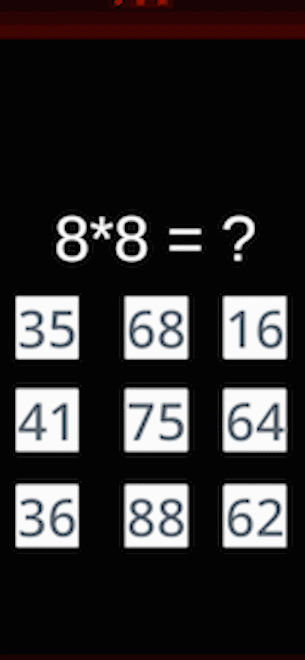


The alarm types all work, the colored one has been replaced with a game I find way more fun, as it really forces you to wake up before managing to stop the alarm but makes you hate the app.
When all of this was done, I luckily had a classmate that agreed to download the app and trust me to wake him up in the morning, he eventually showed up on time, I only have the footage he recorded to prove it.
Huge shoutout to Louis for trusting me with his time !
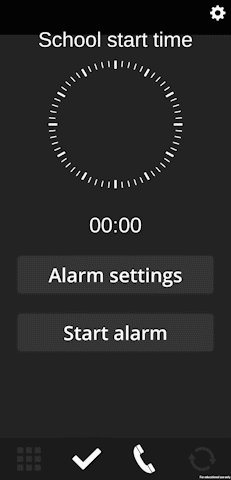
Louis' footage
Even though the prototype is not complete, there are still insights we can draw:
- Louis tried to set the time the other way around, needs more testing
- The motivation isn't expressive enough, he fills in a "bad" reason
- Louis managed to arrive on time
- The routine is affordant
- The app allows for enough customization
- Have a real UI
- Developp missing features
- Analysis of behavior for tailored sleep patterns
- Learnt about Google's sprint methodology
- Managed to prototype an app in a short period of time
- Learnt a lot about sleep patterns, which impacted the way I handle my sleep a lot
Thank you
For reading until there, if you're interested I'd be glad to connect with you !
Contact me
